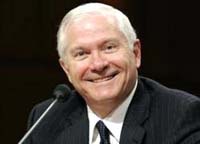Afghanistan, Turkey to be hottest issues on NATO talks

Turkey’s border with Iraq and U.S. demands for Europe to be more active in Afghanistan are expected to be main issues on a meeting of NATO defense ministers opening Wednesday in the Netherlands.
Although not on the official agenda, the situation on Turkey's southeastern frontier risks overshadowing the two-day gathering.
Turkey's NATO allies have expressed solidarity following a surge in attacks by Kurdish rebels, but have also urged restraint as the Turks consider retaliatory attacks on Kurdish bases over the border in Iraq.
The NATO meeting comes amid intense diplomatic efforts to avert a Turkish offensive, which Western nations fear could bring chaos to one of the most stable parts of Iraq.
On Afghanistan, U.S. Defense Secretary Robert Gates will push European allies to deploy more troops, putting the focus on military training teams that allied commanders see as vital to an eventual exit strategy for international forces.
Gates is also expected to seek helicopters, transport planes and quick maneuver troops to fill shortfalls in NATO's 40,000-strong Afghan force during the talks in the North Sea resort of Noordwijk.
Gates criticized some European members of NATO on Monday for failing to provide the extra troops that their governments promised last year for the force.
"I am not satisfied that an alliance whose members have over 2 million soldiers, sailors, marines and airmen cannot find the modest additional resources that have been committed for Afghanistan," Gates said Monday during a visit to Ukraine.
As part of efforts to fill gaps, ministers will consider a plan to lease transport helicopters from private companies - possibly from Ukraine or Russia. To allay safety fears, diplomats say the leased aircraft would be used only to carry equipment and supplies, freeing up NATO's military choppers to transport troops.
The U.S. wants allies to more than double the approximately 20 teams of embedded trainers serving with Afghan army units. NATO commanders say such teams are key to preparing local forces to gradually take over from international forces - although they believe it could be five to 10 years before Afghan troops can operate independently without U.S. and NATO support.
Relations with Russia, the future of Kosovo and the troubles facing NATO's new elite response force will also feature during the talks.
Allies are expected to pledge to maintain NATO's 16,000 peacekeepers in Kosovo at full strength over the coming months as the province threatens to defy Serbian opposition and declare independence before the end of the year.
The U.S. recently committed to keeping its 1,600 troops in Kosovo until at least the middle of next year. After that, Washington has warned European allies that it may have to redeploy its soldiers from Kosovo to fill any lingering shortfalls in Afghanistan.
For the first time, officials from the United Nations, European Union and World Bank will join NATO defense ministers as part of the alliance's drive to coordinate the Afghan security mission with civilian reconstruction and good governance efforts. Defense ministers from Afghanistan and senior officials from non-NATO nations with troops in the mission, such as Croatia or Australia, are also due to attend.
Several NATO members - such as Britain, Canada and the Netherlands - have significant deployments of combat troops fighting alongside U.S. forces against the Taliban in southern and eastern Afghanistan. Washington has long complained that others should send more, particularly to the front-line regions.
The meeting's Dutch hosts in particular are hoping allies will help them in the dangerous southern province of Uruzgan. The Dutch parliament must decide within a few weeks whether to extend the two-year mandate of its 2,000-strong force that ends next August. Many politicians say they should only stay on if they get greater support from allies.
Russia's defense minister, Anatoly Serdyukov, will join the NATO talks on Thursday when differences over Kosovo and proposed U.S. anti-missile bases in Eastern Europe are expected to loom large.
Subscribe to Pravda.Ru Telegram channel, Facebook, RSS!


